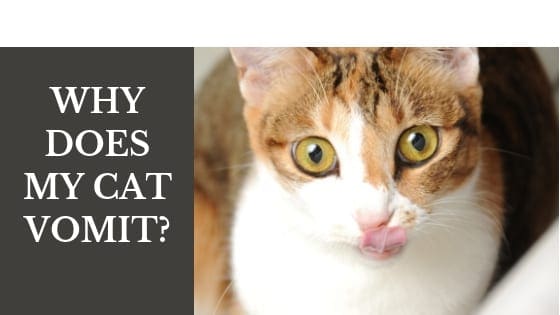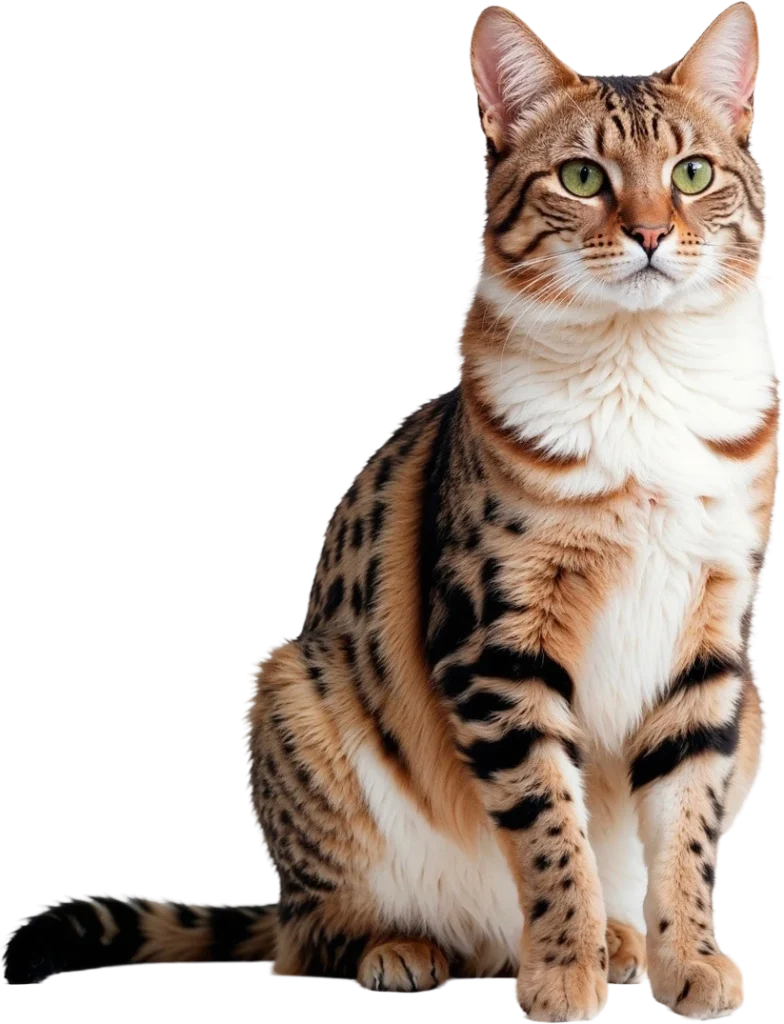
If you live with a cat, you have most likely had to clean up some vomit from time to time. Vomiting in cats can be a sign of various health conditions. Many cat parents may disregard vomiting and label it as a typical or normal cat behavior but it’s important to know that it’s not normal. Vomiting means something is wrong. The cause could be serious or minor but it definitely means your attention is required.
If your cat is vomiting it’s important to determine the cause as it could indicate a potential medical problem.
The Difference Between Vomiting and Regurgitation
Regurgitation involves bringing undigested food back up out of the mouth or esophagus that hasn’t reached the stomach. Vomiting involves expelling the contents of the stomach up through the mouth.
Potential Reasons for Vomiting
Hairballs
Cats groom frequently and as a result, hair gets swallowed. The backward-facing barbs on the cat’s tongue prevent them from spitting out the hair so they have no choice but to swallow it. The hair may pass through the system without issue and get eliminated in the stool. Hairballs may also not pass easily in the intestines and they could cause a blockage. Sometimes though, the accumulating hair doesn’t make it through the stomach and gets vomited back up. When a cat vomits up a hairball it typically appears as a cylindrical shape. If your cat frequently vomits hairballs it indicates there’s a problem. The cat may be grooming more than usual due to stress, a medical issue, pain, parasites, or simply because he isn’t getting brushed at all.
There are OTC hairball prevention products available to help hairballs go through the cat’s system more smoothly but you should first talk with your veterinarian because there may an underlying cause for the hairball vomiting that needs to be addressed medically.
This can be the result of making an abrupt change in the cat’s diet, whether that includes changing brands or types. Dietary changes should be gradual to give the cat’s system time to adjust. It also decreases the chances of the cat rejecting the food. Vomiting may also occur if a change in diet includes an ingredient that causes stomach irritation.
During the holidays, it’s not uncommon for cats to end up vomiting due to ingestion of rich foods that are either given to them by dinner guests or due to grabbing food that has been left out.
A change in diet from dry food to wet food may cause vomiting due to the increased richness of canned meals. Make a gradual transition by feeding just a little canned food each time, along with the dry. During each meal, slowly increase the amount of canned and decrease the dry.
Talk to your veterinarian to make sure you’re feeding the appropriate food as well. Your veterinarian will provide more detailed information on how to do a dietary transition based on your individual cat’s case specifics.
Eating too Fast
Some cats eat as if they haven’t had a meal in days or as if they’re worried this will be the very last one. If your cat was a rescue who had difficulty getting food, the fear of never having enough could develop into a habit of gulping food quickly.
If cats in a multicat environment feel threatened about the availability of resources or if one cat bullies another at the feeding station, gulping may occur which can then lead to vomiting.
If your cat eats too quickly, here are some options to try:
- Make sure rapid eating doesn’t have an underlying medical cause
- Feed smaller meals more frequently
- Incorporate puzzle feeders
- Use slow-feeder bowls with barriers
- Press wet food against sides of bowl or use a muffin tin so the cat has to work harder
- Don’t allow one cat to bully at the feeding station
- In a multicat household, set up individual bowls and separate as far as needed
- Address multicat tension that may be causing rapid eating or resource guarding
- If needed in a multicat environment, set up multiple feeding stations to ensure peaceful mealtime
Plant Eating
Some cats enjoy munching on plants and unfortunately many houseplants are toxic to one degree or another. Depending on the specific plant, the result can range from mild stomach irritation to lethal toxicity. Keep all plants out of your cat’s reach to prevent vomiting.
If your cat loves munching on greenery there are safe alternatives in the form of kitty grass. You can buy grass kits at your local pet product store and online.
Milk
Cats shouldn’t drink cow’s milk as they lack the enzyme lactase, which is necessary for digestion of the milk sugar. Offering milk to your cat can result in diarrhea and vomiting.
Obstruction
A cat may vomit if a foreign object was swallowed and is causing an obstruction or a hairball is unable to pass. If you suspect your cat has swallowed a foreign object, get to the veterinarian or emergency veterinary clinic immediately.
Internal Parasites
Intestinal parasite infestation can cause vomiting. You may even see evidence of worms in the vomit. Your cat needs to be seen by the veterinarian for a deworming.
Poisoning
Because cats are such fastidious groomers, any substance they brush up against or walk through will end up being ingested. Keep all cleaners, paints, and chemicals safely put away. Clean spills and drips immediately and completely. If you suspect your cat has ingested a chemical substance, contact your veterinarian immediately as this is an emergency.
Diseases and Disorders
Vomiting can be associated with so many diseases or health conditions, such as:
- pancreatitis
- liver disease
- kidney disease
- tumors
- gastritis
- hyperthyroidism
- urinary infection
- diabetes
- heat stroke
- food allergies
- severe constipation
The list could go on but the bottom line is that vomiting is a sign that something is wrong and needs attention.
Is Vomiting an Emergency?
Sudden, severe or ongoing vomiting is an emergency. Blood or foreign objects in the vomit indicate emergency care is needed. If the vomit looks like coffee grounds, that’s also an emergency. Vomiting accompanied by change in appetite, appearance, behavior, or change in grooming habits may also indicate an emergency situation. Don’t brush the situation off by assuming cats typically vomit every day. Vomiting isn’t normal and it requires your attention.
What Not to Do
- Don’t ignore the problem
- Don’t make abrupt changes in food
- Don’t leave plants, cleaners and chemicals in reach of a cat
- Don’t leave small or tempting objects in a cat’s reach (earrings, rubber bands, etc)
- Don’t give medication for vomiting unless specifically instructed to do so by your veterinarian
Need More Information?
ASPCA List of Poisonous Plants
For more information on cat behavior and health, refer to the books by best-selling author Pam Johnson-Bennett. Pam’s books are available at book stores and online. We’ve included Amazon links here on our website.
If you have a question about your cat’s behavior or health, contact your veterinarian. This article is not intended as a medical diagnosis nor is it a replacement for your cat’s regular veterinary care. This article is for general information purposes only.



